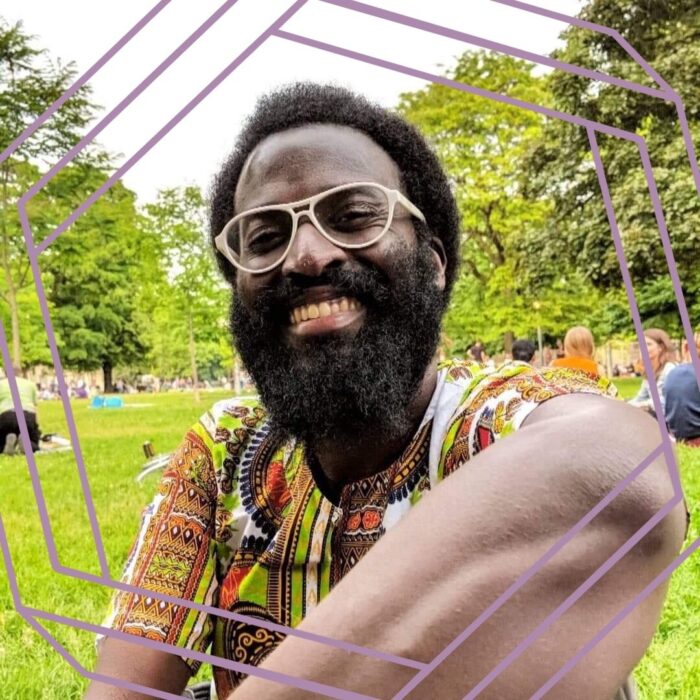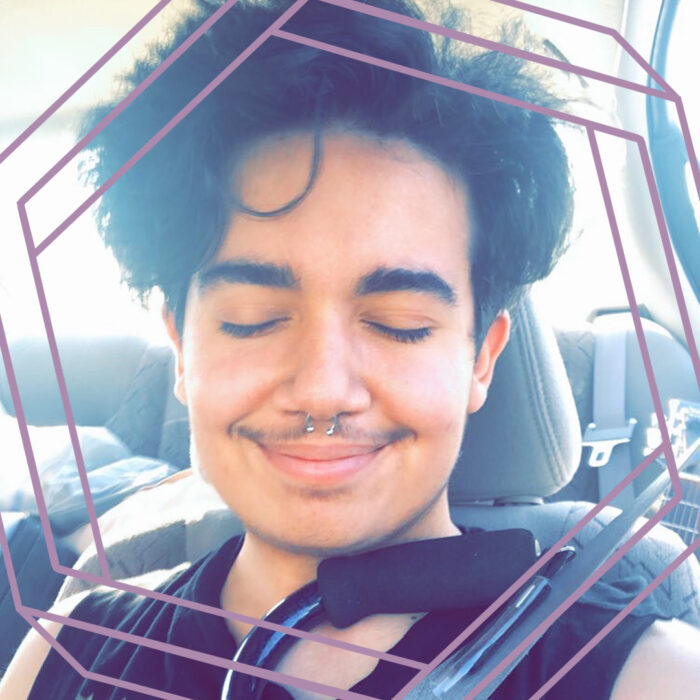78 – Mugabi
Description
 </figure>
</figure>Mugabi Bienkya talks strokes, international healthcare systems, and medical racism.
Transcript
Brianne: I’m Brianne Benness and this is No End In Sight, a podcast about life with chronic illness.
[guitar riff]
Drew: Hey this is associate producer Drew Maar. Before we get started, here’s a quick reminder that you can find No End In Sight on patreon, which is a really simple way for listeners to subscribe to support the show financially on a monthly basis. So if you’ve been enjoying the podcast and you also have a couple bucks to spare, We’d be so so grateful if you’d sign up as a patron at patreon.com/noendinsight. Today we’ll be talking with Mugabi Bienkya about strokes, international healthcare systems, and medical racism. Mugabi also talks about his book Dear Philomena, which you can buy here. Some content notes for this episode: There’s some talk of food and appetite at the top of the interview and then again around 55 minutes in. There is discussion of electroshock therapy around 30 minutes in. Mugabi and Brianne discuss religion and faith healing from around the 40 minute mark to around the 55 minute mark. There’s some talk of the Vietnam war, landmines, and the Cambodian genocide around an hour in. As mentioned before, medical racism and colonialism are major themes of this interview, and there is a story of racism at the University of Michigan Hospital starting around an hour and 20 minutes in. The discussion surrounding this story includes a non-reclamatory use of the N-word and a mention of a gun. The bulk of this story should be over by the hour and 25 minute mark. Around an hour and 45 minutes in there is discussion of anti-Blackness from white women specifically, and this includes some conversation about Emmett Till. This story should be over by the hour and 50 minute mark. This episode also includes mentions of addiction stigma, forced tapers, the concept of “drug-seeking” and the ways anti-Blackness ties into these. Those take place at around an hour and 45 minutes in and 2 hours and 10 minutes in. And finally this interview includes a detailed description of suicidal ideation and auditory hallucinations as side effects of medication which goes from around the one hour and 30 minute mark to around the one hour and 40 minute mark. Before we start, here’s our disclaimer: This podcast is not intended as a substitute for professional medical advice, diagnosis or treatment. Make sure you talk to your practitioner about any questions or symptoms.
[guitar riff]
Brianne: Okay. Well, I’m so excited to be talking. I like to start by asking people, how was your health as a kid?
Mugabi: So as a kid from about zero to nine, I would call myself relatively healthy. I can remember like, two alarming health incidents before nine years old, one being that I had jaundice as a baby. I was born in Nigeria, and it’s fairly common in Nigeria. And so it’s like, an alarming health thing, but at the same time, a fairly common alarming health thing.
Brianne: So like, scary at the time, but not necessarily… like, plenty of people experience it and it doesn’t mean anything further, probably.
Mugabi: Exactly, exactly. Some people end up developing complications from it, but most recover and go on to like, live healthy, able-bodied lives. And I don’t even remember it because I was a baby. So
Brianne: yeah. Right. Of course.
Mugabi: it did not affect me at all. And the other being that I had a tapeworm in my stomach when I was like, six or so. And I just remember that because I remember like, not having any appetite or not really having any desire to really eat food. And my mom was always like, up in my business being like, “Oh, how come you won’t eat?” I was just like, “Let me live my life. I’m not hungry.”
Brianne: Yeah, “This is fine.” And she’s like, “It might not be yet actually.”
Mugabi: Exactly. So she took me to the doctor and got me dewormed, and like, this giant tapeworm came out of me, which I was like just super grossed out about.
Brianne: I bet! You were like, “Bodies! What are they doing?”
Mugabi: It’s very, very creepy cause I don’t even know how it got in there in the first place. It was probably like, while I was playing like, in the dirt with my friends or something. But I remember after the tapeworm got removed, that was the first time that I discovered appetite. I was like, “Wow! So this is what it feels like to be hungry.” Cause I never really felt hungry before that as far as I remembered, because when you’re six, you don’t really have that much of a memory. My first couple of memories are like, four or five and so like, I didn’t really remember much of eating and enjoying food until the tapeworn got removed. And then I was like, “Wow, I’m hungry all the time, and I love food.” And I realized that the reason that I never felt hungry was because this tapeworm was just sitting in my tummy, making me feel full and eating all my food. So after that I put on a lot of weight because I was like, “Oh my God! Food is amazing.”
Brianne: You were like, “This is a very different experience.”
Mugabi: But those are like, the two, which were like, alarming, but not really massive deals. So I became disabled when I was nine years old because when I was nine years old, I had my first stroke.
Brianne: Okay, so between six and nine, you were eating and doing all of these things. And then I imagine as a nine year old, this wasn’t something that you were kind of… either anticipating or knowing how to make sense of. So what… what was that like for you? Do you have a lot of memory now about what happened beforehand or how things unfolded or is it mostly things that you’ve heard repeated back?
Mugabi: I remember it… Memory is one of those funny things where like, I think I remember it, but then again, I’ve also heard the story 1,000,001 times, and I also wrote about the story in my book. And so like, I’m not sure whether it’s like, the memory of what I wrote or the memory of what I’ve heard or the actual memory, but I do have a very…
Brianne: Yeah. You have a timeline that you know about.
Mugabi: Yeah, and I do remember it clearly because like, there are only three times in my life that I have felt what I felt when I had my stroke. And those three times were the three strokes that I’ve had. It’s a very, very distinct feeling, and so I remember what happened. And it was very, very disconcerting because I had no frame of reference whatsoever. I was nine years old. I was just like, playing with my friends.
Brianne: Yeah. And I also don’t know much about the healthcare system in Nigeria. So were you still living there and what happened? Could you add that context as you’re talking, I guess? Basically, tell us a bit about the healthcare system, as you’re telling us about how you discovered this feeling, that… why would a nine year old have any context for? You know what I mean?
Mugabi: So I’m not living in Nigeria. My parents are Ugandan, but my dad used to work for the UNDP. And so before I was born, he got his job.
Brianne: As it happens. Yeah.
Mugabi: And then they assigned him to the Nigeria branch of the UNDP.
Brianne: Oh, gotcha. So when you were nine, I would love to hear about the healthcare system you were also working within because I know they’re so different in every country.
Mugabi: So when I was nine, my family was actually living in Bangladesh. Because the way the UNDP worked at that time was they really worried about people getting a corrupt and getting in a government’s pocket cause it happened a lot. Bribery is a very common practice.
Brianne: They were trying some other things.
Mugabi: Yeah. And so the way that they figured out to like, work around that, is anybody who was like, in a semi… senior-ish position, they moved them to a different country every three or four years, so that you wouldn’t get too comfortable and wouldn’t start taking bribes and getting corrupt.
Brianne: You wouldn’t be compromised.
Mugabi: Exactly. According to their studies, it’s around the fifth year mark, when you like, start getting like, “Oh, I should, you know, start taking a bribe.”
Brianne: Maybe that’s how long it takes for someone to convince you. It’s like, five years is how long it takes a really good corrupter to get into… to get you in their pocket? I don’t know which way that works.
Mugabi: I mean, it makes s







